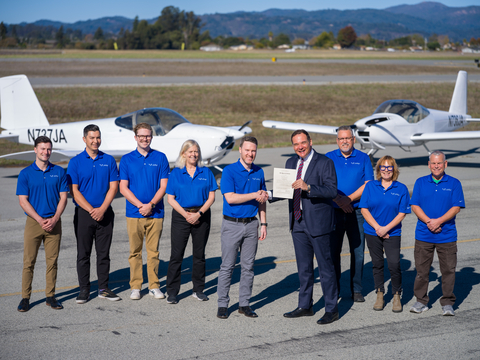Joby Aviation, Inc. (NYSE:JOBY, Financial), a company developing electric air taxis for commercial passenger service, today announced it has received a Part 141 certificate from the Federal Aviation Administration (“FAA”) for its flight academy as well as FAA acceptance for its air operations voluntary Safety Management System (“SMS”) as established under Part 5.
This press release features multimedia. View the full release here: https://www.businesswire.com/news/home/20241203364977/en/

Joby received its Part 141 certificate from the Federal Aviation Administration, enabling the company to deliver streamlined pilot training through its Flight Academy. Photo: Joby Aviation
The FAA Part 141 certificate enables the Joby Aviation Academy to deliver streamlined pilot training, enabling the Company to efficiently and economically develop a pipeline of qualified pilots in advance of commercial air taxi operations.
As Joby prepares to launch commercial service, future aviators will be able to enroll in Joby Aviation Academy's full complement of courses, which will include private pilot, instrument rating, commercial pilot, and certified flight instructor, in preparation for a career at Joby or other air operators.
Bonny Simi, President of Operations at Joby, commented: “We’re pleased to be ticking two more items off our operations checklist as we continue to lead the industry towards commercialization of electric air taxis. As a former airline pilot, I’m particularly looking forward to seeing our Flight Academy grow in both courses and students in the coming years as we offer highly competitive prices and strong training curricula that position graduates for success in the industry.”
Joby is also advancing its safety culture by receiving acceptance from the FAA for its Part 5 air operations voluntary Safety Management System. While Part 135 operators have several years to comply with the FAA SMS mandate, Joby’s Part 135 operation achieved the milestone years ahead of the deadline. This SMS requirement for air taxi operators involves developing clear safety policies and procedures as well as a culture that prioritizes safety and encourages team members to report safety concerns.
“We are also building a strong safety foundation for our planned operations with the FAA acceptance of our Safety Management System governing air operations under our Part 135 operation, Joby Elevate,” Simi added.
The Part 141 certificate and Part 5 air operations SMS are requirements for Joby to launch its planned air taxi service, as presented by the Company in June 2024 during a presentation titled “Pre-Flight Checklist: An Introduction to Joby Air Taxi Operations.”
Joby’s Part 5 air operations SMS is part of the Company’s Enterprise SMS currently being developed, which will cover the aircraft, manufacturing, operations, maintenance, and flight training, facilitating the exchange of information to continuously improve the safety of Joby’s aircraft and operations.
The Joby electric air taxi is designed to carry a pilot and four passengers at speeds of up to 200 mph, offering high-speed mobility with a fraction of the noise produced by helicopters and zero operating emissions.
About Joby
Joby Aviation, Inc. (NYSE:JOBY, Financial) is a California-based transportation company developing an all-electric, vertical take-off and landing air taxi which it intends to operate as part of a fast, quiet, and convenient service in cities around the world. To learn more, visit www.jobyaviation.com.
Forward Looking Statements
This press release contains “forward-looking statements” within the meaning of the “safe harbor” provisions of the Private Securities Litigation Reform Act of 1995, including but not limited to, statements regarding the development and performance of our aircraft, the growth of our manufacturing capabilities, our regulatory outlook, progress and timing; our business plan, objectives, goals and market opportunity; and our current expectations relating to our business, financial condition, results of operations, prospects, capital needs and growth of our operations, including the expected benefits of our vertically-integrated business model. You can identify forward-looking statements by the fact that they do not relate strictly to historical or current facts. These statements may include words such as “anticipate”, “estimate”, “expect”, “project”, “plan”, “intend”, “believe”, “may”, “will”, “should”, “can have”, “likely” and other words and terms of similar meaning in connection with any discussion of the timing or nature of future operating or financial performance or other events. All forward looking statements are subject to risks and uncertainties that may cause actual results to differ materially, including: our ability to launch our air taxi service and the growth of the urban air mobility market generally; our ability to produce aircraft that meet our performance expectations in the volumes and on the timelines that we project; the competitive environment in which we operate; our future capital needs; our ability to adequately protect and enforce our intellectual property rights; our ability to effectively respond to evolving regulations and standards relating to our aircraft; our reliance on third-party suppliers and service partners; uncertainties related to our estimates of the size of the market for our service and future revenue opportunities; and other important factors discussed in the section titled “Risk Factors” in our Annual Report on Form 10-K, filed with the Securities and Exchange Commission (the “SEC”) on February 27, 2024, our Quarterly Report on Form 10-Q, filed with the SEC on November 6, 2024, and in future filings and other reports we file with or furnish to the SEC. Any such forward-looking statements represent management’s estimates and beliefs as of the date of this release. While we may elect to update such forward-looking statements at some point in the future, we disclaim any obligation to do so, even if subsequent events cause our views to change.
View source version on businesswire.com: https://www.businesswire.com/news/home/20241203364977/en/